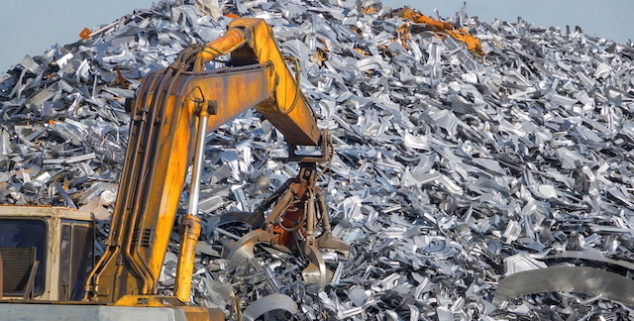Opinion
Scrap metal recyclers a key to manufacturing economy
 A crane with a claw digs into a mound of scrap metal at a recycling yard. (Photo: oneSHUTTER oneMEMORY, via Shutterstock)
A crane with a claw digs into a mound of scrap metal at a recycling yard. (Photo: oneSHUTTER oneMEMORY, via Shutterstock)As someone who has been deeply involved in the state regulatory process for many years, and who has experienced the outcomes of this process both good and bad, I was concerned about a recent push by the Department of Toxic Substances Control (DTSC) to adopt “emergency” regulations that would impose “hazardous waste” rules on the state’s metal-recycling plants – rules that have the potential to shut down a vibrant recycling industry.
Though the initial push for these changes was withdrawn, DTSC is now moving forward again to file different emergency regulations where no emergency exists, and channels for input are quite limited.
The lack of emergency is apparent on the face of DTSC’s new public notice of their filing. Given DTSC’s persistence in proceeding down a path that deprives all interested stakeholders an opportunity to take part in this important matter of public policy, it’s crucial to explain why these regulatory changes affecting metal recycling are neither necessary nor workable.
These metal-recycling facilities are not a public nuisance or health threat. All are located in ports or other areas zoned for industrial activity.
California is still the largest manufacturing state in the country, and the durable-goods manufacturing sector in particular depends on a free flow of recycled scrap metal to make the consumer products — vehicles, appliances, fixtures, metal furniture, food and beverage cans — we all need and buy.
In fact, we are the largest user of recycled goods. Regulations that interfere with a reliable and affordable supply of scrap metal will be challenging for manufacturing, and our recycling policies should always be considered with utmost scrutiny regarding their impacts and necessity.
California produces vast quantities of scrap metal every single day, millions of tons per year – including more than 1.5 million cars and other vehicles (trucks, trailers, buses, railcars, etc.), used refrigerators and other household appliances, and myriad other metal-containing items that have outlived their original purpose
For more than 50 years, the metal-recycling industry has safely and efficiently processed the overwhelming majority of this scrap metal, sending it to steel mills and smelters for use as raw material in the production of new products. This valuable material contributes to lower costs of steel products, saves huge amounts of energy, and is better for the environment.
If metal-recycling facilities are unable to operate in a sustainable manner, achievement of the state’s environmental and recycling goals will be severely compromised.
In fact, most steel produced today contains about 75 percent recycled metal – and some products are made entirely of recycled steel.
It is important to note that the processes used to shred and separate scrap metal are purely mechanical and do not involve the use of chemicals, heat, incineration or any other material or technique that could be considered hazardous, toxic, or poisonous.
Metal-recycling operations have never been subject to regulation as hazardous-waste treatment under either California or federal law, for good reason. Yet the DTSC is misusing the emergency rule-making process – a process reserved for grave and unforeseen risks to public welfare — to declare scrap-metal recycling as such.
These metal-recycling facilities are not a public nuisance or health threat. All are located in ports or other areas zoned for industrial activity. In many cases, these facilities have co-existed with longtime neighbors who are not even aware of their presence.
Thousands of proud employees in local communities actually support their families by working in this important industry. The sector’s employers are good actors who should be recognized for their environmental stewardship and their economic contributions to the well-being of so many people.
If metal-recycling facilities are unable to operate in a sustainable manner, achievement of the state’s environmental and recycling goals will be severely compromised. And the quality of life for all Californians will be affected, as the state struggles to find ways to deal with the massive quantities of scrap metal that will rapidly accumulate with nowhere to go.
State government should solve real problems, not create new ones. DTSC’s attempt to unilaterally impose punitive and unnecessary regulatory restrictions on a major industry through emergency-rulemaking is a serious abuse of the process. The California metal-recycling industry is successful and is doing exactly what they need to do.
DTSC should abandon this misguided effort and begin working with all stakeholders to find a sensible and non-destructive path forward. DTSC needs to demonstrate that it can and will take a different path when presented with compelling evidence that its current path will have negative consequences for all.
Good government demands no less.
—
Editor’s Note: Lance Hastings is president and CEO of the California Manufacturers & Technology Association. Prior to joining CMTA, he served as vice president of national affairs for MillerCoors.
Want to see more stories like this? Sign up for The Roundup, the free daily newsletter about California politics from the editors of Capitol Weekly. Stay up to date on the news you need to know.
Sign up below, then look for a confirmation email in your inbox.

Leave a Reply